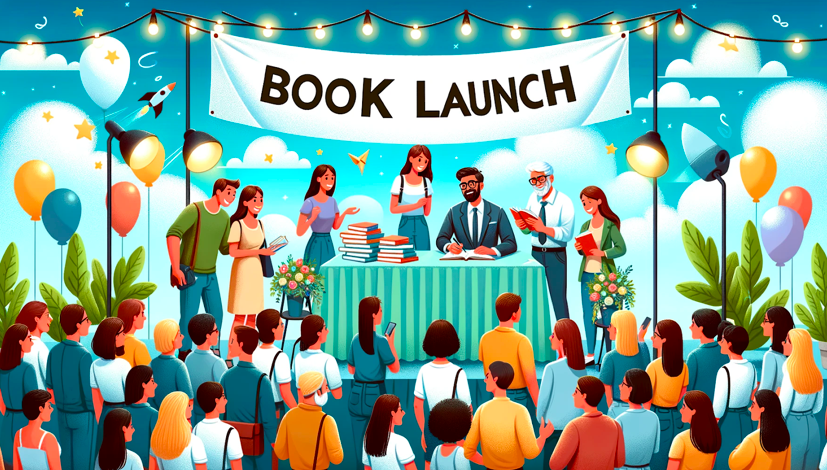The success of a new book in today’s competitive publishing landscape often hinges on the effectiveness of its launch strategy. A well-planned book launch is crucial not only for introducing the book to the world of prospective readers but also for setting the stage for its commercial success. In a market brimming with new releases, effective launch strategies are essential for authors to distinguish their work and spark initial momentum.
These strategies are pivotal in transforming the launch of a book from a mere publication into a significant cultural presence. They help establish the book in the market, captivate potential readers, and ensure it stands out. Importantly, they play a critical role in boosting book sales. A resonant launch can increase an author’s visibility, leading to a surge in initial sales and attracting attention from retailers and reviewers. This initial success often translates into sustained sales and word-of-mouth promotion, essential for long-term success.
Ultimately, a book launch is more than a business event or an announcement; it’s a multifaceted strategy involving marketing, engagement, and building lasting relationships with readers. Implementing effective launch strategies can be the difference between a book that merely exists and one that thrives, both in sales and reader engagement.
This article aims to provide authors with five tips for successful book launch strategies. By exploring these methods, authors can learn how to effectively promote their books, engage with their audience, and significantly boost their sales.
Strategy 1: Leveraging Social Media and Online Platforms
Building an Engaging Social Media Presence
Building an engaging social media presence is crucial for authors in the digital age, serving as a potent tool to reach new readers and generate excitement around their books. Tailoring content to suit the strengths and preferences of each social media platform, while maintaining a consistent voice and brand, is essential in creating an effective and far-reaching social media presence.
Your Publishing Journey Awaits – Start NowPlatforms like Instagram are great for showcasing visually appealing elements such as book covers, snippets of pages, aesthetic imagery, or even videos related to the book’s theme. Engaging with followers through TikTok videos, showing the writing process, for example, can also add a dynamic aspect to your promotion.
X, formerly known as Twitter, with its fast-paced nature, is great for quick updates, engaging in literary conversations, and connecting with other authors and influencers in the writing community. Utilizing hashtags related to books, writing, or specific genres can exponentially increase your reach on this platform.
Facebook offers a unique opportunity to build communities by creating engaging groups. Authors can create or join genre-specific groups to share content, participate in discussions, and connect with readers who have similar interests. LinkedIn can be used to network with industry professionals, share more detailed content about your writing journey, and establish yourself as a thought leader in your genre.
Consistency in posting is key across all platforms, as it keeps your audience engaged and helps in building a loyal following. Interacting genuinely with your followers by responding to comments, participating in discussions, and acknowledging their support plays a vital role in fostering a strong connection with your audience. This strategic approach not only boosts your book’s visibility but also enhances your profile as an author, opening doors to new opportunities and a wider readership.
Utilizing Free and Paid Book Promotion Sites
Book promotion sites are invaluable tools for authors, offering a platform to showcase their work to avid readers. Free sites like Goodreads allow authors to connect directly with their audience, participate in Q&A sessions, and garner reviews. Another popular option is BookBub, which offers a free service for listing books, particularly helpful for authors during promotional periods like a book launch or when offering discounts.
Paid promotion sites provide additional reach and targeting options. For example, services like BookBub’s Featured Deals offer targeted email blasts to readers who have expressed interest in specific genres, providing a more directed approach. Kindle Direct Publishing (KDP) Select also allows authors to run low price point promotions and provides placement in emails and on-site. These paid options often result in higher visibility and sales, making them a worthwhile investment for many authors, especially during the crucial launch phase. Balancing free promotion and paid promotion strategies can create a comprehensive approach that maximizes an author’s exposure to potential new readers.
Creating a Captivating Landing Page on Your Author Website
An author’s website serves as a central hub for their digital presence, and a captivating landing page is essential for effective book promotion. This page should be focused, engaging, and designed to convert visitors into readers. Key elements include a striking book cover image, a compelling book description, and clear calls-to-action (CTAs) like ‘Buy Now’ or ‘Read a Sample’. Adding personal touches, such as a brief author bio or insights into the writing process, can further engage visitors.
Incorporating social proof, such as notable reviews or awards, can bolster credibility and interest. It’s also essential to ensure the author website or page is optimized for mobile devices, as a significant portion of web traffic comes from mobile users. Lastly, integrating an email sign-up form allows for direct communication with interested readers, offering a way to build a dedicated fan base and keep them informed about future releases and events. A well-crafted landing page not only promotes the current book or release date but also lays the foundation for ongoing author-reader engagement.
Engaging Email Subscribers
An email list is a vital asset for authors, providing a direct line of communication with their audience. Building this list can start long before a book launch, through methods like offering a free chapter in exchange for email sign-ups or running contests. Once established, this list becomes a powerful tool for launch announcements and ongoing promotions.
When engaging with subscribers, it’s important to offer value beyond just sales pitches. This could include exclusive content, insights into the writing and publishing process, or early access to new releases. Personalization can also enhance engagement, such as addressing subscribers by name or segmenting the list to send more targeted content based on reader preferences. Regular but not overwhelming communication helps keep readers engaged and interested, making them more likely to support current and future book launches. An effective email strategy can turn casual readers into loyal fans, crucial for long-term success as an author.
Strategy 2: Crafting a Compelling Launch Day and Week
Planning a Successful Book Launch Party
A book launch party is a pivotal event in the life of your book, marking its entry into the literary world. Authors can choose between physical and virtual launch parties, each offering unique benefits. Physical parties, held in bookstores or other venues, provide a tangible, intimate experience, allowing direct interaction with readers, signings, and photo opportunities. To enhance the event, consider themed decorations related to your book, interactive readings, or Q&A sessions.
Your Publishing Journey Awaits – Start NowOn the other hand, virtual parties have gained popularity, particularly for their broader reach and accessibility. Platforms like Zoom, Facebook Live, and TikTok can be used to host these events, incorporating live readings, virtual Q&A sessions, and interactive discussions with attendees from around the world. Both types of parties can include giveaways or contests to add excitement. The key is to create an engaging, memorable experience that resonates with your audience, building anticipation and enthusiasm for your official book release date.
Coordinating with Book Signing and Local Business Events
Integrating book signings with local businesses can significantly enhance your book’s launch. Partnering with local bookstores, cafes, or cultural centers for signings not only provides a physical space for your event but also taps into the existing customer base of these establishments. This collaboration can be mutually beneficial, as it drives traffic to the business while providing you with a platform to interact with potential readers.
In addition to bookstores, consider other community events where your book could be featured. Local fairs, literary festivals, and cultural events are excellent opportunities to showcase your work. These events can increase your book’s visibility and help you connect with a wider audience. When planning these events, it’s important to consider the logistics, such as the availability of your books at the venue, promotional materials, and any necessary equipment for readings or presentations. Effective coordination with local businesses and event organizers is key to ensuring a successful and impactful book signing event.
Utilizing a Calendar App for Scheduling All Launch Activities
The complexity of a book launch requires meticulous planning and organization. Utilizing a calendar app or a project planning tool is essential for efficiently scheduling and managing the myriad of activities involved in a book launch. These tools allow you to visualize your entire book launch timeline, set reminders for important tasks and deadlines, and ensure that no detail is overlooked.
From coordinating with vendors and venues for launch events to scheduling social media posts and promotional activities, a calendar app can be your central command center. It enables you to allocate time for writing press releases, engaging with your social media followers, and preparing marketing materials. Additionally, these tools can often be shared with your team, including publicists, marketing professionals, and assistants, facilitating smooth communication and coordination among all parties involved.
By keeping all your tasks and events organized and accessible in one place, you can navigate the launch period with greater ease and efficiency. This organization not only helps ensure a successful launch week but also reduces stress, allowing you to focus more on the exciting aspects of your launch party and releasing your book to the world.
Strategy 3: Targeted Marketing and Promotional Materials
Developing Effective Marketing Materials
Effective marketing materials are essential in capturing the attention of potential readers and creating a lasting impression. Key components include:
- Book Cover: The cover is often the first point of contact with your audience. It should be professionally designed to convey the essence of your book and appeal to your target market.
- Book Description: A compelling description is crucial. It should be concise, and engaging, and highlight the unique aspects of your story or content.
- Author Bio: Include a brief, relatable bio that connects with your audience and establishes your credibility.
- Promotional Graphics and Videos: Create eye-catching graphics and promotional videos for use on social media, your website, and in advertisements.
- Press Kit: A press kit containing a synopsis, author bio, press releases, and high-quality images can be invaluable for media outreach.
Using these materials consistently across various social media platforms, like your own website, social media, email newsletters, and press releases ensures a cohesive and professional image.
Special Promotions and Discounts
Offering promotions and discounts during your book launch can significantly attract readers and boost sales. Consider these strategies:
- Launch Price Offer: Introduce a special discounted price for a limited time during the launch.
- Bundled Deals: Offer your new book bundled with previous works at a discounted rate.
- Time-limited Discounts: Use flash sales or limited-time offers to create urgency.
- Pre-order Specials: Provide incentives for pre-orders, like exclusive content or signed copies.
- Giveaways and Contests: Host contests with your book as a prize to generate excitement and engagement.
These offers can be promoted through your social media channels, email lists, and on your website to maximize reach.
Collaborating with Influencers and Indie Book Lounges
Leveraging Influencers
Leveraging influencers in the same genre as your book can be a highly effective strategy for reaching your target audience. The key is to identify influencers whose followers align with your intended readership. Once identified, you can offer them a copy of your book, inviting them to review it or promote it on a social media post on their channels. This collaboration not only amplifies your reach but also lends credibility to your work through their endorsement.
Additionally, you can enhance engagement by collaborating with these influencers on activities like giveaways or live Q&A sessions. Such interactive events not only intrigue and involve their followers but also provide a platform for direct interaction and promotion, further elevating your book’s visibility and appeal within the target community.
Your Publishing Journey Awaits – Start NowUtilizing Indie Book Lounges
An “Indie Book Lounge” typically refers to a platform, community, or venue dedicated to promoting and supporting independent authors and their books. Unlike mainstream publishing, indie (independent) publishing allows authors to publish their works without going through traditional publishing houses. Here are some key features of indie book lounges:
Utilizing indie book lounges presents a valuable opportunity for independent authors to showcase their work. These platforms are frequented by a dedicated community of readers who are actively seeking to discover new authors. By participating in the promotional programs offered by these lounges, authors can gain significant exposure. This participation could include having their books featured in newsletters, prominently displayed on the lounges’ websites, and promoted across their social media channels. Such targeted visibility is instrumental in connecting with an audience that is already inclined towards supporting and exploring independent authors, making indie book lounges an essential component of a successful book promotion strategy.
Both strategies allow you to tap into established communities and networks, increasing your book’s exposure to a targeted audience, and thereby enhancing the potential for sales and long-term reader engagement.
Strategy 4: Personalizing the Experience for Your Audience
Understanding and Connecting with Your Target Audience
Understanding and connecting with your target audience is fundamental to a successful book launch. This process begins with identifying the potential audience for your book. Who are they? What are their interests, age groups, and reading preferences? Once you have a clear picture of your book’s potential audience, tailor your launch to meet their expectations. If your book is a young adult novel, consider platforms and events that resonate with younger readers.
For a mystery thriller, focus on platforms where readers of this genre congregate. Pay attention to the language, imagery, and themes that appeal to your audience. Engaging with readers on social media, through newsletters, or in reader forums can provide valuable insights into their preferences. Personalizing your approach based on these insights ensures a deeper connection with your audience, making them more likely to be interested in and advocate for your book.
Creating a Personal Connection
Incorporating personal experiences and stories into your marketing narrative can create a deeper, more meaningful connection with potential readers. Share the journey behind your book – the inspirations, challenges, and triumphs. This storytelling approach humanizes you as an author and makes your book more relatable. It’s not just about selling a book; it’s about sharing a piece of your life and inviting readers to be a part of it.
Create content that reveals your writing process or the backstory of your characters. Use platforms like blogs, social media, or author interviews to share these insights. Personal connections are fostered when readers feel they are getting to know the author behind the book. This approach not only builds interest in your current book but also fosters a loyal readership for future works. A personal touch can transform a potential buyer into a loyal fan who is more likely to engage with and recommend your upcoming book to others.
Organizing Interactive Events to Engage the Audience
Interactive events are a dynamic way to engage your audience during your book launch. For example:
- Live Q&A Sessions: Host sessions where readers can interact directly with you, asking questions about your book and writing journey, enhancing reader engagement.
- Virtual/In-Person Book Readings: Provide immersive experiences with readings that include audience participation and live discussions, making the event more interactive.
- Online Contests: Organize creative contests like fan art or story-writing based on your book’s theme to engage and excite your audience.
- Community Building: Use these events to foster a sense of community among your readers, making the book launch more personal and memorable.
Strategy 5: Post-Launch Activities and Long-Term Planning
Gathering and Utilizing Feedback for Future Book Launches
After the excitement of the book launch, it’s crucial to gather and analyze feedback for future improvement. Book reviews and reader feedback are invaluable resources. Positive reviews can be used in marketing materials and to bolster your credibility, while constructive criticism offers insights into areas for improvement. Engaging with readers through social media or email can provide direct feedback on both the book and the launch event itself.
Surveys or questionnaires can also be a structured way to gather feedback. Pay attention to comments about the book’s content, the effectiveness of the marketing strategies, and the overall reader experience. This feedback is not just about the book itself, but also about how it was received and the effectiveness of your promotional and marketing efforts beforehand. Use this information to refine your approach for future events and book launches, ensuring each is more successful than the last. Continual learning and adaptation are key to long-term success in the ever-evolving world of book publishing.
Planning for Long-Term Success
Long-term success in book publishing requires sustained effort beyond the initial launch. Post-launch, continue to engage with your audience through regular updates, newsletters, and social media interactions. Share your journey post-launch, including any events, upcoming book signings, or new projects. This consistent engagement helps maintain interest in your book and builds a loyal readership for future works.
Planning for future book projects should begin soon after the launch. Reflect on what themes or stories resonated most with your audience and consider how you can incorporate these insights into future works. Additionally, maintain relationships with industry contacts such as publishers, bookstores, and influencers, as they can be crucial for future collaborations.
Marketing efforts should also continue. Consider running periodic promotions or discounts to reignite interest in your book. Keep an eye on trends in the book market and adapt your strategies accordingly. By continuously engaging with your audience and the market, you set the stage for sustained success and a lasting career in writing.
Reflecting on the Launch and Adjusting Strategies
Reflection is a crucial step after a book launch. Take time to analyze which aspects of the launch were successful and which were less so. Ask yourself questions like:
What marketing strategies brought the most readers?
Which events had the highest attendance or engagement?
Did certain platforms or promotional materials yield better results than others?
This reflection isn’t just about celebrating successes; it’s about understanding the dynamics of your launch.
Utilize sales data, feedback, and observations to evaluate the effectiveness of different strategies. It’s important to be honest and critical during this process. Recognize that not every tactic will work for every book or audience, and be prepared to adjust your strategies accordingly.
Learning from both successes and shortcomings allows you to build a more effective blueprint for future launches. Perhaps a certain social media platform proved more effective than others, or a particular type of event resonated more with your audience. These insights are valuable for refining your approach, ensuring that each upcoming book launch is more successful than the last. Continuous improvement, based on reflective learning, is key to a thriving career as an author.
Your Publishing Journey Awaits – Start NowIn this article, we’ve explored five key strategies crucial for a successful book launch. We started by emphasizing the role of leveraging social media and online platforms to build a strong digital presence, crucial for reaching a wider audience. The importance of a compelling launch day and week was highlighted, with a focus on engaging events like launch parties and book signings to generate buzz. We then delved into creating targeted marketing materials and the necessity of personalizing the experience to forge deeper connections with readers.
Post-book launch, the importance of gathering feedback and reflecting on the launch’s effectiveness was stressed, underscoring the need for adaptability in future strategies for book release. A well-planned book launch is foundational not just for immediate sales, but for establishing a lasting presence in the literary world. Implementing these strategies can significantly enhance a book’s impact, setting the stage for sustained success and a robust writing career.








